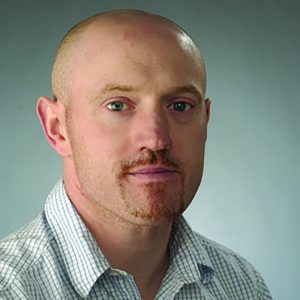Syracuse University has a long history of supporting the nation’s veterans, dating back to 1944. Then-Chancellor William P. Tolley helped draft the G.I. Bill, instrumental in helping millions of veterans through the years pursue an education or training. In 1946, Chancellor Tolley announced Syracuse’s “uniform admissions program,” which ensured all military personnel admission to Syracuse upon return from war. Continuing this legacy of veteran support, one faculty member’s medical research in the College of Arts and Sciences today is helping those who served.

Nearly 25 percent of veterans receiving care at VA medical centers are diagnosed with diabetes, compared to just over 9 percent of the general population. Through a three-year, $3 million grant from the Department of Defense, Robert Doyle, the Laura J. and L. Douglas Meredith Professor in the Department of Chemistry in the College of Arts and Sciences, will work to develop a new drug to treat veterans with comorbid diabetes and obesity. These are referred to as comorbid because a patient who is obese is at an increased risk for developing diabetes.
The grant will allow Doyle, principal investigator, and co-collaborator Christian Roth, principal investigator at Seattle Children’s Hospital, Washington, to create the peptide drug (GEP44) from the design phase all the way to clinical development, which means developing, testing and validating it for translation into humans.
For people suffering from diabetes, the body cannot produce or properly use insulin, which is key to carrying sugar out of bloodstream and into cells. Without insulin, the sugar stays in the bloodstream, causing high blood sugar levels and leading to complications like kidney disease or failure, nerve problems in the skin, heart attack or stroke.
Doyle, along with chemistry graduate student Brandon Milliken, hopes to create a drug that facilitates a greater than 12 percent weight loss, controls glucose levels, helps protect the pancreas from further inflammatory damage—slowing the progression of diabetes—and causes no nausea or vomiting.
The drug Doyle is developing is a peptide (small protein) that targets gluco- and appetite-regulatory pathways in the human central nervous system and the pancreas. The drug will target three receptors at once: appetite suppression and glucoregulation (GLP1-receptor), appetite suppression (NPY2-receptor), and pancreas protection (NPY1-receptor).
A portion of the grant will allow for the purchase of a state-of-the-art peptide synthesizer. Before having this apparatus, Doyle’s team would have to order each peptide from a variety of companies, usually taking four to six weeks for delivery. The synthesizer will now allow the research team to produce the peptides in a matter of hours.
“We can literally design a new peptide in the morning and have it by lunchtime,” Doyle says.
This cutting-edge research is made possible by a sizable grant from the Department of Defense and is one of many examples showing Syracuse University’s support to veterans. Syracuse University was recently rated as the top private school for veterans in 2020 by Military Times and is fifth overall, thanks to policies related to military and veteran students, academic outcomes, military-supportive cultures and other factors. The Daniel and Gayle D’Aniello Building, slated for its grand opening later this year, is home to the National Veterans Resource Center. It is headquarters to state-of-the-art vocational and educational programs designed to advance the economic success of the region’s and the nation’s veterans and military families, and also support veteran-connected academic research and technology.
“SU has a great history of looking after our veterans,” Doyle says. “We are a veteran-oriented University, and this is very veteran-oriented research that will benefit those who have served for years to come.”
Written by Dan Bernardi.
